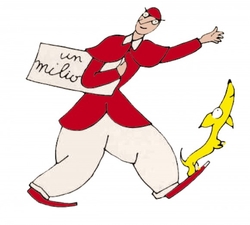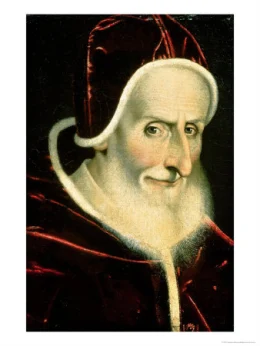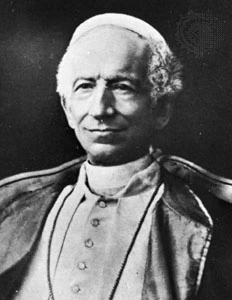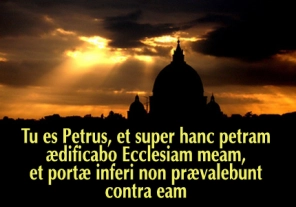Daily Archives: February 24, 2013
“Grow In Awareness”: Really?
Lately, at a Novus Ordo Mass in the Home Counties, a rather disturbing homily.
The priest first gets all excited talking of the role of the women in the Gospel; then he says that as the church grows, we have now a “growing awareness” of the role of the women within the Church; then goes on saying that he hopes in future the church will continue to “grow in awareness ” and “better reflect” it in the way she “considers the role of women within the Church”.
I cannot avoid thinking that if the Bishop gave the order that ” by every homily suspected of heresy the priest will be punished with ten strokes irrespective of whether the heresy was there or not” we would have a remarkable clarity in the statements from the pulpit, and there would be no danger whatever of the faithful being confused. Alas, my suggestion being of questionable legal feasibility I am afraid we will have to live with the stink of heresy in the church as long as a certain category of priests live.
In this case, the shepherd informed his flock of the following:
1) Jesus wasn’t much grown in awareness. Actually, he seems to have had a lot to grow in awareness.
2) For 2000 years, the Church’s awareness was also rather dim. I suspect the Holy Ghost was on the phone and couldn’t intervene.
3) But now, now finally we are “growing in awareness”. We woke up from our Gospel-induced slumber and now start to see clearly what Jesus could not see.
Obviously, dear shepherd stopped short of looking for big trouble. He went around the real topic for a couple of minutes, without ever mentioning it. He hinted at “changes” the “growing awareness” might introduce, but kept the emergency exit conveniently open and didn’t really say *that*.
The result was clear: the audience was under the impression the priests wants *that* kind of change but obviously can’t say it openly, and the priest was the progressive hero of the community without risking his job.
I think the thing with the caning should be attentively considered.
Mundabor
Say “Thanks” To The King Of Bahrain!
The King of Bahrain has donated 9,000 square metres of land to the Vicariate of North Arabia for the edification of.. a Catholic cathedral!
With 9,000 sm (around 100,000 sf) land at its disposal, the new Cathedral won’t dominate the landscape (I think there will have to be all the ancillary buildings, the parking lots, ways in and out, the distances from the neighbouring plots, and so on), but it will be certainly impossible to ignore. I truly hope a very traditional building style will be chosen.
Whilst I will charitably assume (nice as I am) that the King has donated the land to the Church out of a spirit of sincere admiration for Christianity, my less idealistic side leads me to believe this is part of the “charm offensive” presently put in place from all the regime of the region, aimed at making the region not only fairer for the natives, but more attractive for foreigners.
A wise move, if you ask me. It is beautiful to think that, if this is done properly, thousands of immigrant Catholic workers will have the opportunity to attend in a big church, hopefully very Western in its style, able to let them feel at home.
A “thanks!” to the King of Bahrain is certainly in order.
Mundabor
Pope Benedict Defends His Abdication
During his last Sunday as a Pope, the Holy Father has indirectly – but clearly enough – defended his decision to abdicate. Once again, he has said he cannot do his job properly any more, and a life of prayer is now both more fitted to him and – which I am sure was the paramount consideration in his decision – more salutary for the Church and faithful.
There are around voices that say this was a mistake (sometimes, a big or catastrophical one) and the Holy Father should have done strange things, like allowing the Church to remain without an effective guide, permit that internal strife of all kind tears the shop apart (a frequent result of weak leadership, as the Vatican itself now more than eloquently shows) and in general see the detetioration of the Church in the West continue.
In the immortal novel I Promessi Sposi, Alessandro Manzoni puts in the mouth of Don Abbondio (the weak and cowardly priest who had consented not to celebrate a marriage because of pressure from a local warlord, animated by the most scandalous motives) the unforgettable words: “Il coraggio, uno non se lo puo’ dare”. It is difficult to translate into a foreign language the particular way Italians stress a point, but a fair translation might be “with courage it is so, that one can’t give it to oneself”; whereas probably the beauty and drama of the original are lost, but the basic message remains.
Don Abbondio has become in Italy the epitome of the weak, self-centred, cowardly priest interested more in living a quiet and -in those times – comfortable and privileged life than in fighting for Christ as a good priest, at the cost of his life if needs be. His words express a simple concept, well clear to us soft and understanding Italians: you can’t ask from people that they just become who they are not. Don Abbondio must choose between a defiance of power that (he thinks, being cowardly) might mean death, and a compliance allowing him to go on – or so he thinks – with his quiet life of comfort and privilege.
Now, whilst I do not want to draw too near a comparison between Pope Benedict and Don Abbondio, it is clear that neither of them is a Horseman of the Apocalypse. Old, peaceful, not cut for war, and unable – like everyone else – to completely change what he is, it simply cannot be asked of Pope Benedict that he jumps over 86 years of his life and starts to live and act according to a freely chosen new persona. It just does not work that way.
With courage – or with the will to be a strong, energetic, willful Pope, leading the Church with a firm hand and expecting to be obeyed – it is so, that one cannot give it to oneself.
Courage, the Holy Father has gathered enough – very probably more than he ever could in his life – when he has decided to abdicate, full knowing the fans of the “dying Pope circus” (so popular only a few years ago, and so beloved by the media, and so obscenely convenient for heterodox Cardinals and Bishops) would be incensed at him depriving them of another year-long media show.
Not only he had courage, but if you ask me he took what is – with Summorum Pontificum – the smartest decision of his reign.
A Pope is, in fact, there to reign, not simply to talk. His duty is to give orders, make unpleasant decisions, displease an awful lot of people and upset many more, defy secular powers whenever necessary, and defy the stupidity of the world every single day. It takes energy and courage to do so. Pope Benedict never had the second, and is rapidly losing the first. Nor could anyone expect of him that he suddenly transforms himself into a different person overnight. God can cause such tranformations, of course, but they are very rare. Normally, weak people won’t be able to give themselves the courage they lack.
Don Abbondio tries to get away with his weakness, and is in serious trouble when his behaviour comes to the ears of his superiors. Pope Benedict, far braver and more honest, realises he can’t be any good for the Church as an even weaker Pope, and draws the consequences. From a weak Pope you can really not expect more than this.
Not only, therefore, I think that His Holiness’ decision should be respected, but I think that the courage necessary for such a step should be recognised and duly appreciated.
The alternative would have been another year-long power vacuum. But as power, like nature, has horror vacui, this vacuum would have been filled by people who have never been elected Pope, and taking all decisions with very little of the (earthly) responsibility.
A Pope is a King, not an exposition item for the joy of the TV channels. We need him strong, alert, and full of energy. Weak Popes of the “harmless great-uncle”-type only benefits the local hierarchies and the Vatican power groups, particularly if they aren’t orthodox.
With courage it is so, that one cannot give it to oneself.
Mundabor
Cardinal O’Brien Is In Need Of Instruction.
The most remarkable trait of V II prelates seems to be that very few of them manage to know Catholic teaching with the same level of expertise of, say, a thirteen-year-old boy circa 1953.
The last one to make an ass of himself is Cardinal O’Brien.
It is today reported by the “Guardian”, the “Homograph”, the “Puffington Post” and many others and many others that the Cardinal now says the Church should allow priests to marry.
His words according to the above mentioned “Homograph”:
“In my time there was no choice and you didn’t really consider it too much, it was part of being a priest. When I was a young boy, the priest didn’t get married and that was it.
“I would be very happy if others had the opportunity of considering whether or not they could or should get married.
“It is a free world and I realise that many priests have found it very difficult to cope with celibacy as they lived out their priesthood and felt the need of a companion, of a woman, to whom they could get married and
raise a family of their own.”
Yours truly, who was never married and – sinner as he is, of course – never found it so difficult to cope with celibacy (particularly after seeing some of those who are married; but that’s another matter entirely…), is rather stunned at these affirmations for the following reasons:
1) Last time I looked, it was de fide that a priest cannot marry. One can become priest when he is already married (look at the Anglican converts: for the Church they are no priests, and therefore they can become priests whilst being previously married) but no one can marry after he has become a priest. One of us two is wrong, then, and I think it’s the one with the funny hat…
2) “It is a free world”. What on earth does this mean. Freedom isn’t anarchy or licence; celibacy isn’t more or less difficult under Cameron than under Mussolini; I do not know of many contemporary priests forced to take orders in a dictatorship and now finding it difficult to cope with celibacy because there is freedom.
3) “In my time there was no choice”. Well neither there is now, actually.
4) “You didn’t really consider it too much”. What? The man took a solemn vow of celibacy and now he tells us that was something one just didn’t think about? And then they say today’s youth is irresponsible? Who made this man Cardinal? (Answer: John Paul II…).
5) “companion etc”. Look, I though that a priest was married to the Church? That the celibacy is what allow himself to be completely dedicated to his life of service without having extremely time-consuming (and emotionally exacting) distractions like, erm, “a woman to whom they could get married and raise a family of their own”? That this dedication and self-sacrifice is exactly was makes the priest respected in his community, and trusted to care for Christ and for his sheep above all else? Am I wrong?
6) “found it difficult to cope with celibacy aas they lived out their priesthood”. Oh for heaven’s sake. Are we talking of men or children? You make choices like a man, you carry on with your life and the choices you have made like a man. Can a soldier say “I am tired of Afghanistan”?
7) “I would be very happy etc..”. Dear Cardinal, the opportunity is already there. Either one wants to become a priest, and then he cannot marry. Or he wants to marry, and then he cannot become a priest. A priest can never, could never, will never “have the opportunity of considering”. Once a celibate priest, always a celibate priest and no, the “free world” is nothing to do with it.
In this very matter, it is refreshing to read that a couple of very good priest bloggers have become rather impatient with the Cardinal’s remark. I understand them very well, then the Cardinal lets all celibate priests look like people who didn’t really think about it, have no clear idea why they are celibate, and should well reflect a bit whether to have the “opportunity to consider” wouldn’t be a fine thing indeed.
For one, Father Ray Blake has a rather explicit post on the matter. Among the commentators, EF Pastor Emeritus – another excellent priest and blogger – is no less explicit. Third is Father Hunwicke, a convert from the Anglicans (and therefore, crucially, not a priest when he married), who says it very beautifully with the words: “Wherever did the Cardinal, whom I greatly respect, get the idea that priests like me are allowed to make up our own mind about getting married?”
Interesting question, actually.
Wherever? If you ask me, from the madness called Vatican II, that wanting to “renew” everything ends up wanting to demolish, sooner or later, everything. That’s where.
Mundabor
Spot The Error
Lately heard at a Catholic Novus Ordo Mass.
I confess to almighty God
and to you, my brothers and sisters,
that I have greatly sinned,
in my thoughts and in my words,
in what I have done and in what I have failed to do;
therefore I ask blessed Mary Ever-Virgin,
all the Angels and Saints,
and you, my brothers and sisters,
to pray for me to the Lord our God.
And no, I am not kidding.
Mundabor
Vatican II: Crime And Punishment

I often have the impression that God is allowing the Church in the West to go to the dogs to punish Her for the arrogance and ungodliness of most Conciliar Fathers, all of them coming from the (un)civilised West and all of them trying to blandish the Western masses.
In this perspective, I cannot avoid theorising that John Paul I would have been a great Pope, and The Lord took him away from us to allow the Church to pay the price of her own madness to the last penny. It is, in this perspective, as if the Lord would say: ” You made such a devastation of the Faith, and you now hope to get away with it with only fifteen or twenty years of suffering? Not so fast, boys….”.
Idle thoughts, I know; but thoughts with a certain logic to it, I think. We have seen in the history of the Church that whenever the Bride behaves very badly, the Bridegroom punishes her in an exemplary manner. The Great Schism, the Heresies of the XVI Century, even the traumatic Sack of Rome in 1527 can, I think, safely interpreted in this way. In modern days, the election and long pontificate of JP II led to a strong growth in Africa and Asia, but with a clear decay of Catholicism in the West. Wherever you look, society was so different then from today, and in 1978 you could still have called – abortion and all – Europe “Christian”, at least compared to today. As we write the year 2013, Catholicism is growing fast elsewhere, but is possibly in the eve of a big persecution in the West.
Live by the V II madness, die by the V II madness. The sins of the V II generation have fallen, and will probably continue to fall, upon the children and grandchildren of those who thought Christianity could be made conveniently sexy. This has happened already in form of countless broken families, rampant materialism, and advance of aggressive secularism; and this will continue to be the case – unless something intervenes – either in form of persecution or, if we manage to escape the latter, of even more lost souls caused by rampant heathenism and acceptance of every abomination. Asia and Africa might in fact be spared, and will – even with all the problems caused by Vatican II, like bad liturgy – actually continue to grow and possibly lead the charge for the Reconquista of the Western world to Christianity. They also are the continents whose clergy generally refuse to appease the secular sheep, which is probably why their sheep tend not to be very secular.
Again, idle thoughts; but if they make any sense at all, one wonders where we are now in the process. If the Lord in His infinite goodness has decided the impiety of V II has been paid harshly enough, we might slowly start to see Popes and attitudes of a different kind. If it is decreed in Heaven that the price of rebellion shall be paid in full, the decomposition of Catholicism all over the West will go on, and lead to even more devastation.
Our Lady of Quito said that the recovery will happen when everything seems lost, and one might argue in countries legislating in favour of abortion, euthanasia, and sodomy very much has been lost already. Still, no one would say the Church is in such bad shape that all appears lost, and there is reason to be afraid we have, by far, not seen the worst.
Only imagine what the election of a so-called “Benedict clone” would lead to, with the German bishops attacking Catholicism for the next fifteen years, undisturbed, and Vatican Archbishops going around asking that life be made “easier” for sodomites living in sin and scandal…
It doesn’t bear thinking.
Thinking of the coming conclave, this actually scares me not a little; but who knows, perhaps the Lord has decided in His mercy that we have paid a steep enough price already, and will move the Cardinals to sincere prayer and a courageous choice. This would be very difficult, though, as more than a few Cardinals must be afraid of the consequences for themselves if a strong and orthodox Pope is elected, and very many of them are, if looked closely at, part of the problem. This conclave is very important because it is fair to say the Church is more attacked now, and the situation has become far worse in the West, than in 2005. A great chastisement has been going on, and continues to cast his shadow all over the (un)civilised West.
Please Lord, please give us a strong, orthodox Pope.
Mundabor






















You must be logged in to post a comment.